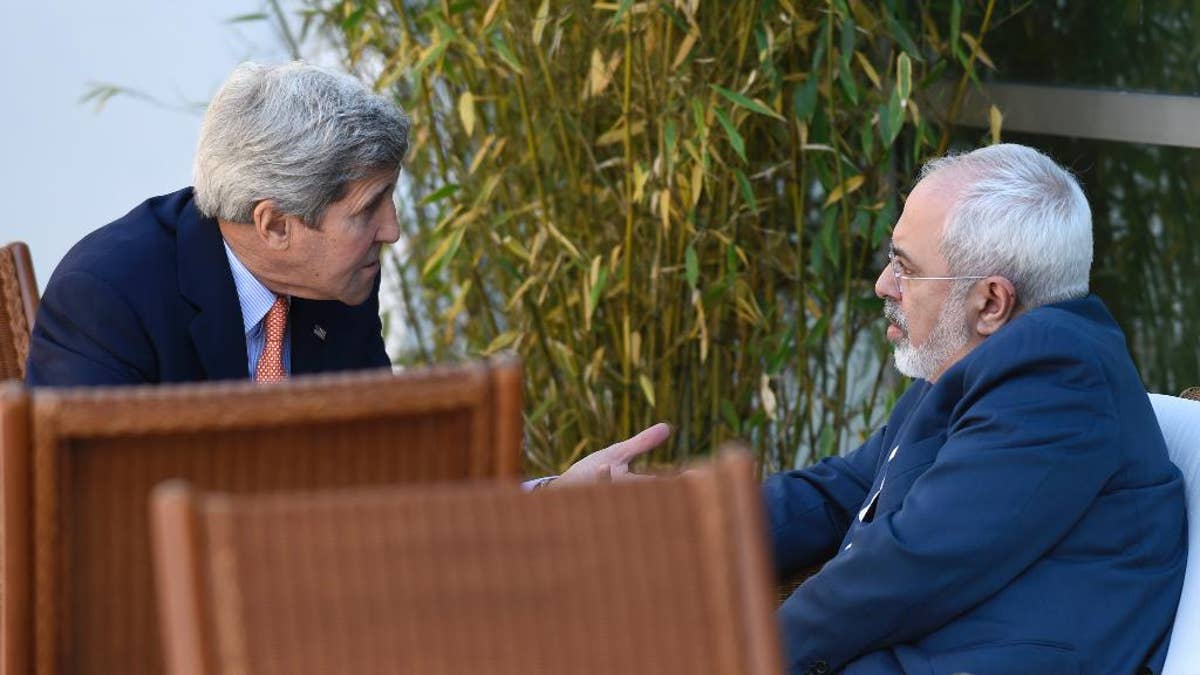
FILE -- May 30, 2015: Secretary of State John Kerry, left, talks with Iranian Foreign Minister Mohammad Javad Zarif, in Geneva, Switzerland. (The Associated Press)
As the June 30 deadline for a nuclear agreement with Iran approaches, I am deeply skeptical of the Obama administration’s claims that its emerging deal will eliminate every pathway to a nuclear weapon. A good agreement must curb Iran’s support for terrorism, include strong verification measures, address its intercontinental ballistic missile (ICBM) program, and roll back its vast nuclear infrastructure. If the Administration fails to secure an agreement that meets these objectives, the consequences for the security of the United States and our allies would be dire.
Any deal with Iran’s Islamist extremist regime, the world’s foremost state sponsor of terrorism, carries with it enormous risk. This is a regime we cannot trust. While Benjamin Netanyahu, Israel’s prime minister, spoke to a joint session of Congress in February, Iran blew up a mock U.S. aircraft carrier in the Strait of Hormuz. For decades Iran has supported terrorist groups like Hezbollah, which has attacked the United States and Israel and targeted Jewish communities worldwide. In Iraq, Iran killed and wounded American troops by providing advanced improvised explosive devices and other weapons to Shi’a militias. Further, it stokes sectarian fires – from Iraq to Yemen – empowering Sunni extremists like ISIS and Al Qaeda.
The international community is now on the brink of freeing up billions of dollars for a regime that has blood on its hands and whose leaders chant “death to America”. Yet we have no indication that Iran will curb its nefarious behavior if it is relieved of sanctions. In fact, the Chairman of the Joint Chiefs of Staff Gen. Martin Dempsey recently indicated that Iran will use sanctions relief to replenish its coffers with cash to sow further destruction. Iran’s decades-long quest to build a nuclear weapons program simply cannot be divorced from its aggressive support for terror worldwide and its bid for regional hegemony.
Iran has continued to stonewall the international community over the military dimensions of its nuclear program. Yet Secretary Kerry appeared to drop longstanding demands that Iran come clean about these activities, telling reporters this month that the U.S. is “not fixated on Iran specifically accounting for what they did at one point in time or another.” This deeply troubling comment severely undercuts years of work by the international community to gain transparency. How can we have any confidence in a future verification regime without a full accounting of Iran’s weaponization efforts?
Iran also cannot be allowed to escape scrutiny for its ongoing efforts to develop delivery vehicles for a nuclear warhead, including ICBMs, which the Ayatollah says Iran should “mass produce”. Yet the Obama Administration has ruled out addressing Iran’s ongoing efforts to develop ICBMs which the intelligence community estimates could be developed by the end of the year. This is a missed opportunity to address a key point in our negotiations with Iran.
Furthermore, a final agreement must provide for “anytime, anywhere” inspections, including Iran’s military facilities. Unfortunately, senior Iranian officials have publicly rejected such a requirement. This alone should be a deal breaker. As former CIA Director Michael Hayden explains, “American intelligence is going to tell you a lot, but to get the level of confidence you will need to legitimate action will require an invasive inspection regime that must be negotiated.”
Our goal must remain preventing an Iranian nuclear weapons capability, rather than merely managing it.
Iran must also dismantle its nuclear infrastructure to prevent it from having a uranium or plutonium path to a nuclear weapon. Instead, the Obama Administration’s interim agreement gives Iran the right to continue to enrich uranium in violation of six U.N. Security Council resolutions. This is a coup for Iran whose president declared that the “world powers surrendered to Iranian nation’s will” because “the centrifuges are spinning and will never stop.”
Our goal must remain preventing an Iranian nuclear weapons capability, rather than merely managing it. A deal that allows Tehran to retain its nuclear infrastructure would leave Iran as a nuclear-threshold state. However, recent press reports indicate that Iran’s infrastructure will not only remain intact, but the U.S. may in fact provide Iran with new nuclear equipment as part of a final deal. This is unacceptable.
While far from perfect, I supported the Iran Nuclear Agreement Review Act, which was signed into law and provides Congress with oversight of any potential agreement with Iran. On such a critical issue to U.S. national security, Congress must assert its historic foreign policy role. As Chairman of the Homeland Security Committee, I will continue to speak out about the dangers of signing a deal with Iran that will pave the way for a surge in terrorism and directly threaten the security of the United States and our allies.
